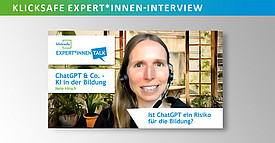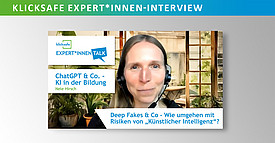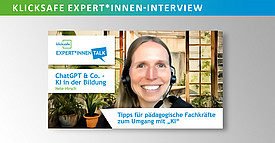AI in school
Since the generative AI ChatGPT became available to the general public at the end of 2022, many people have been thinking about the impact of AI on the school system. How will AI fundamentally change education and learning? Some fear that nobody will learn anything in the future if artificial intelligence spits out all the answers at the touch of a button. Others see AI as a helpful tool to better prepare school content and make lessons more modern and appealing. Even if no one can predict the future, one thing is certain: artificial intelligence has arrived in the lives of pupils and schools will inevitably have to deal with it. klicksafe offers helpful materials for educational practice on this page to tackle this challenge.
STAY SAFE! 5 tips for AI in everyday school life
How reliable is ChatGPT?
The ChatGPT chatbot uses generative AI to provide detailed answers to a wide range of questions. Since its introduction in 2022, it has also become very popular among students and supports them in various areas of everyday school life. Whether it's challenging math problems, writing a book summary, or preparing a history paper - ChatGPT provides tailored answers and solutions.
The problem is that ChatGPT has not been trained to be truthful. Therefore, the answers are not necessarily error-free. And depending on how the chatbot is used, sources may be missing or even made up. Therefore, it is critical to help young people use chatbots like ChatGPT critically. This includes training them on how to evaluate information(source criticism) and educating them on the topic of disinformation.
In the material "How reliable is ChatGPT?" from klicksafe, educational professionals will find compact information about the chatbot and the challenges associated with it. In addition, five lesson examples offer suggestions on how AI-based chatbots can be used in the classroom and discussed with students*.
The lesson examples were made available to klicksafe with the kind permission of saferinternet.at and slightly adapted.
klicksafe Expert*innen-Talk "ChatGPT & Co. - AI in education".
In the klicksafe Expert*innen-Talk on the topic "ChatGPT & Co. - AI in education" Nele Hirsch gives tips on dealing with artificial intelligence in schools. Nele Hirsch is herself an educator and educational scientist and offers impulses, advice and support for good learning in a digitalized society via the eBildungslabor .
In our expert talk, she encourages teachers to familiarize themselves with the topic of AI and to use it both as a learning tool and as a learning object. There is no doubt that integrating AI into school education is a big challenge. So big, in fact, that some may prefer to bypass it. But, according to Nele Hirsch, a lack of engagement with these developments carries the risk that the educational divide will widen. For example, by making some students proficient in the use of AI tools, while others cannot benefit from them. In any case, an increasing use of AI is evident in school environments, where students use ChatGPT to solve tasks - even on exams. This raises questions about school education to which educational professionals need to find answers. Does knowledge retrieval continue to make sense? What skills will even matter in the job market of the future?
It is also clear that young people will be increasingly exposed to images and videos that use AI-based technologies such as deepfakes. Therefore, it is critical to develop information and opinion-forming skills young people. Also with the help of AI-powered tools.
Further materials on the topic of artificial intelligence
Media to School - Machine Learning. Intelligent Machines
The material Machine Learning. Intelligent Machines offers information, methods and practical suggestions for classroom discourse. No prior knowledge is necessary for the students. The material helps to understand the concepts of artificial intelligence and machine learning.
DigiBitS - Fully smart: My future with AI
The teaching unit Fully smart: My future with AI comprises seven to ten estimated school lessons. This provides an opportunity to deal intensively with the topic of AI. The lesson is particularly suitable for social science subjects, but also for business or technology lessons. Students can use a variety of methods to acquire information on the topic and thus learn to understand and assess the many dimensions of AI.
Friedrich-Alexander University Erlangen-Nuremberg - AI Unplugged
With the material on the website www.aiunplugged.org, students playfully learn about the principles behind abstract concepts such as Deep Learning. The special feature is that all activities are carried out without a computer. A free brochure with five activities is available on the website. With these, teachers can convey ideas and concepts underlying the topic of artificial intelligence in a way that is appropriate for the target group.
Teachtoday - SCROLLER magazine for children and interactive learning module
The SCROLLER magazine is aimed at children aged 9 to 12. Through exciting stories, puzzles and interactive hands-on activities, SCROLLER promotes the safe and confident use of digital media. On the topic of artificial intelligence, SCROLLER offers an interactive issue entitled "Fascination AI." In addition, Teachtoday also features an interactive learning module on the topic of "Artificial Intelligence." In addition, a lot of further information can be found in the topic area "ChatGPT & Co.".
Recommendations of the Ministries of Education
In many German states, there are now hints and tips from the ministries of education on the use of AI in schools. Here we have compiled some of them for you.
- Berlin Senate Department for Education, Family and Youth - Recommendations for dealing with AI applications using ChatGPT as an example.
- Ministryfor School and Education of North Rhine-Westphalia - Dealing with text-generating AI systems
- Ministry of Education, Youth and Sports Thuringia - Dealing with generative AI models







